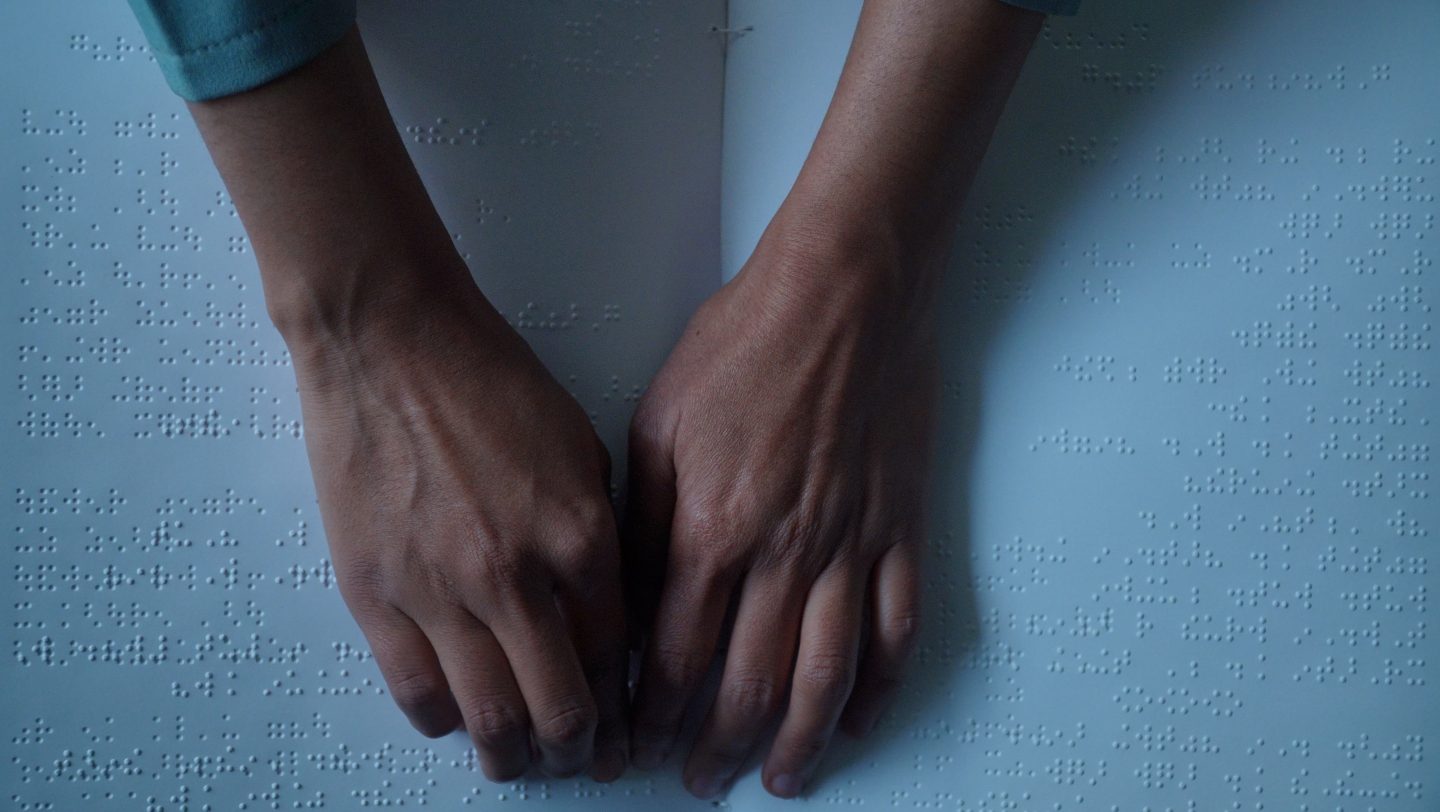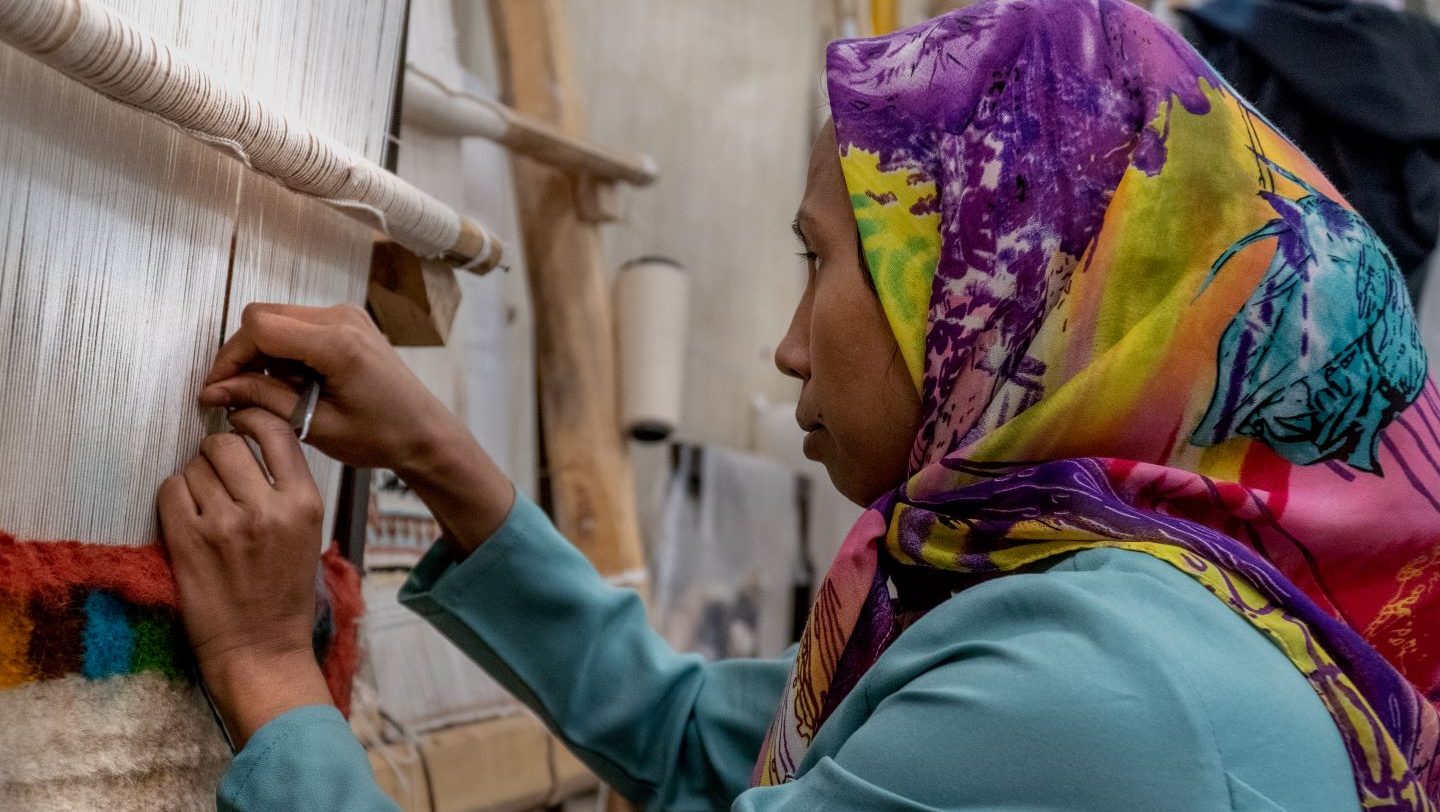With the help of her community in Iran, Maryam overcame the challenges of living with a disability and found inner peace, strength, and independence through her music.
Maryam, 32, an Afgahn refugee in Iran, plays the guitar at the Sepahan Sina music centre in Esfahan.
© UNHCR/Mohammad Hossein Dehghanian
She begins strumming, her fingers twisting elegantly to form the chords of an old Persian love song. “When you are not here, to whom should I repeat my heart’s beat?” she sings, her voice filling the small classroom and the notes from her guitar drowning out her surroundings.
Maryam’s parents fled their native Afghanistan after the Soviet invasion in 1979. Due to a hereditary condition, Maryam was born blind. “I have limited sight and it’s getting worse over time. I see shapes but I can’t see any colours,” she explains.
Growing up with a visual impairment was difficult. “I remember my childhood. All the children would run around, but I couldn’t,” she recalls. “There have been many obstacles… On the streets, since I cannot read, I have to wait for someone to pass by and ask them to read the signs to me.”

Maryam reads a book in braille and wishes she could find music books in braille in Iran. © UNHCR/Mohammad Hossein Dehghanian
But Maryam never let that stop her. While she attended a specialised school until eighth grade, when she enrolled in a regular high school, the lack of books in braille meant that she had to remember the lessons as well as she could before punching holes in a notebook to create her own braille summaries.
When a local charity organised an activity in her neighbourhood to allow people living with disabilities to discover music, Maryam fell in love with the guitar.
“The sound of the guitar brings me inner peace and makes me forget my worries,” says Maryam, remembering how she used to listen to the radio and learn songs by heart with her brother and sister, who are both also visually impaired.
“No matter what happens in life, if I have my guitar, I know I will not be alone. My guitar is my best friend,” she says.
“The sound of the guitar brings me inner peace and makes me forget my worries”
Once a week Maryam meets with Hamid Reza Dorri, her teacher at the music institute, where some 100 Iranians and Afghans living with a disability learn and practice music together, alongside another 3,000 students.
“I cannot imagine what refugees have to go through. They are away from their homeland and some have lost family members. They feel alone, with no sense of belonging. Combine this with having a disability and life becomes insurmountably hard,” says Hamid Reza. “Music can play a healing role, through which people with disabilities get to express themselves.”
It is estimated that among the 68.5 million people displaced around the world, 7.7 million live with a disability. People with disabilities regularly face stigma and discrimination, and many are trapped in their homes, unable to live independently and participate in society on an equal basis with others. In situations of forced displacement, people with disabilities often face additional barriers and limitations.

Maryam learned to weave two years ago and ties every knot with care and affection. © UNHCR/Mohammad Hossein Dehghanian
Maryam has not let her disability get in the way of her life. Not only is she a music virtuoso, but armed with self-confidence and the support from the community, she has also discovered her talent for weaving traditional Persian rugs.
“It is extremely difficult to weave when you cannot see the blueprint for what you are weaving. But I like to do things that others say I cannot do. I go for it and I prove them wrong,” she says.
Nowadays through the weaving orders she receives, she can support both herself and her family.
Every year on 3 December, UNHCR, the UN Refugee Agency, marks the International Day of Persons with Disabilities, highlighting the achievements and contributions of people with disabilities worldwide. This year, UNHCR focuses on the empowerment of persons with disabilities and seeks to drive international action to secure their full and effective participation in all aspects of society.
UNHCR supports people like Maryam through targeted cash-based and in-kind assistance, referral to governmental and NGO partners and inclusion in programmes such as vocational training and livelihoods. In 2019, 124 refugees with specific needs were provided with targeted support in Iran, so they can meet their own needs themselves with dignity.
“Music can play a healing role, through which people with disabilities get to express themselves”
The upcoming Global Refugee Forum to be held 17-18 December in Geneva, Switzerland, will bring together government, humanitarian and development organizations, the private sector, and other partners in an effort to increase international responsibility- and burden-sharing. The Forum aims to ease the burden on host communities, boost refugee self-help, and increase opportunities for resettlement.
Iran has hosted refugees for 40 years and their inclusive and progressive policies have allowed refugees to thrive and not just survive. Now more than ever, the international community needs to step up their support for Iran’s humanitarian efforts so that refugees and other vulnerable people do not bear the brunt of the ongoing economic downturn.
Being able to earn a modest income makes Maryam feel independent. She is now saving up to buy her dream guitar, a black Yamaha.
“My dream is to perform in a big concert hall. My sister and I would play the guitar and sing together like the old days, and my brother would play the piano,” says Maryam. “When we finish, the crowd would stand up and clap for 10 whole minutes. I can already hear it!”
Share on Facebook Share on Twitter